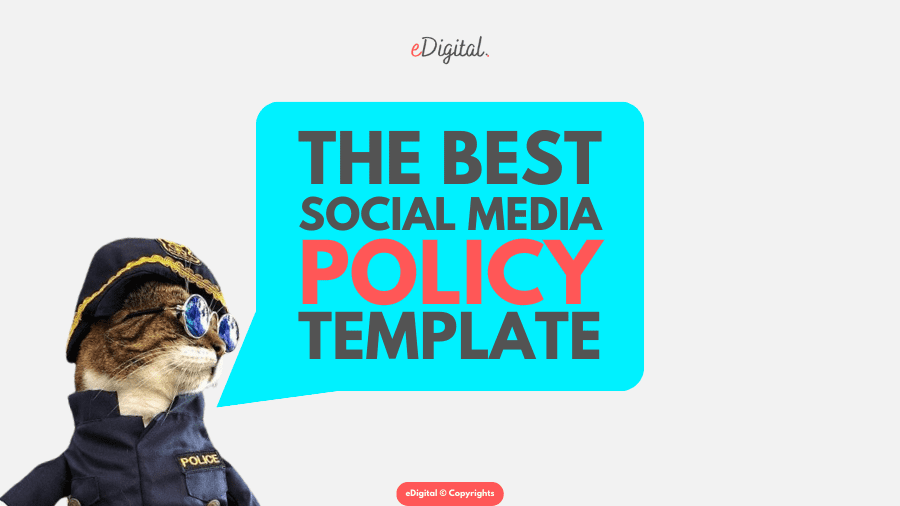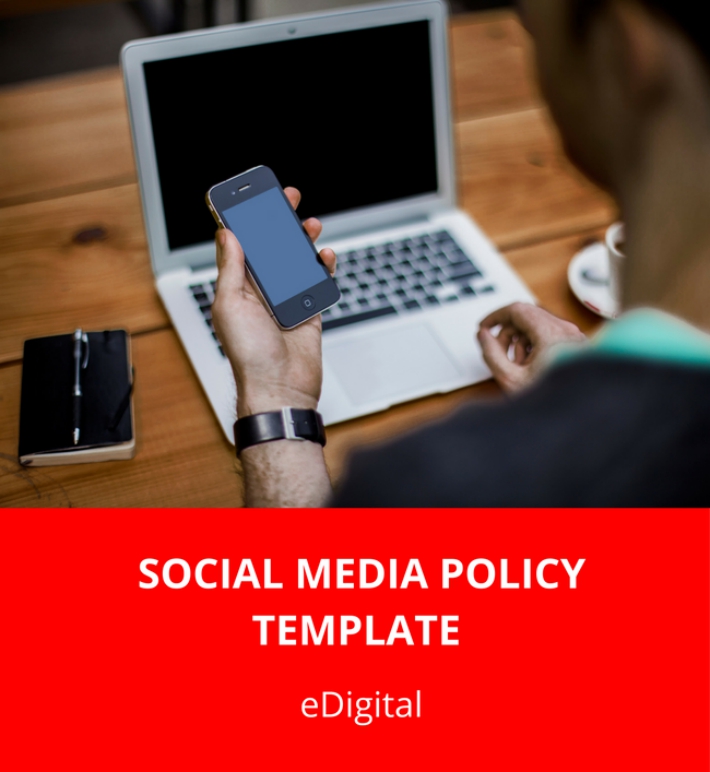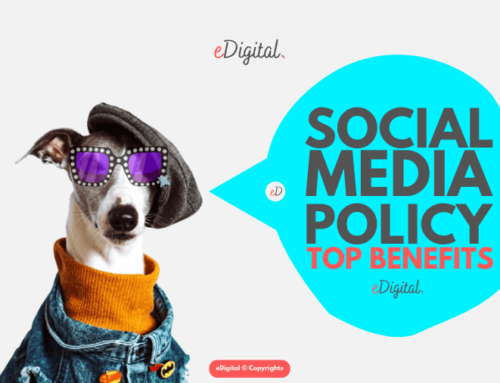THE BEST SOCIAL MEDIA POLICY TEMPLATE IN 2025
Learn how to boost employees’ best use of social media with this exclusive and premium Social Media Policy document template today!
The best tips and tricks when crafting your Social Media Policy / Guidelines + Template in 2025.
Brought to you by Mau, a Senior Social Media Marketing Specialist at eDigital.
THE BEST SOCIAL MEDIA POLICY + TEMPLATE IN 2025
What is a social media policy/guidelines document?
A “Social Media Policy” for employees or a “Social Media Guidelines” is a document written by Marketing, Human Resources or lawyers that provides a standard of acceptable professional and personal online behaviour for employees when talking about the company, its brands, employees, activities and intellectual property.
A social media policy document can be both a public document accessed via the internet on a public company website, privately via a company intranet or physically via reading a printed copy accessed via a tea room or another area within your workspace.
A social media policy should be of easy access by any employee, franchisee and contractor at any given time. This document is the “true” source when someone at your company is not sure what, when, and how they can talk about your company, your employees and its products and services via social media platforms.
Social media policy/guidelines document – Key considerations
- No “one size fits all” Social Media Policy/Guidelines. Drafting a social media policy can be different from business to business. This largely depends on the company‘s culture and strategy toward social media use. For example, an e-commerce website conducting business online would focus on risk managing their social marketing strategies on how they interact with customers online. This focus would be different from a professional services consultancy which would be more concerned with maintaining the goodwill of clients. Both need to protect against the risk of damage to their reputation. A social media policy needs to be individually tailored.
- Involve managers across your organisation. Do proper consultation with your department managers as different departments might have different levels of social media use and risk. Customer service teams might be more in direct touch with customers via social media than your operations team.
- Research the ways that different social media platforms are already being used. Audit what sort of conversations are happening among the most popular platforms and provide examples of what’s acceptable and not. You may have employees in your sales team who might be using social media to attract new leads and clients. Check for their voice and tone and how it aligns with your brand’s values.
- Track via alerts that negative employee commentary or bad sentiment when mentioning your company name or brand names on social media channels. You can do this using Google alerts or paid social media listening tools such as Radian6 (SalesForce), Brandwatch and others. You should pick up patterns from this and take action and fix any problems. Employees are talking about your company and its brands for a reason.
- Use past negative sentiment and commentary as examples when drafting your new social media policy. Make it easy and clear for managers across your organisation to understand social media talk, voice and tone your employees should avoid.
- Consider and predict problems that could arise in the future, especially for an upcoming new product, service or advertising campaign that might create some level of controversy.
- Consultation is key. Understand employees’ key objectives when talking about your company via social media. This will help you gain trust and get buy-in when implementing your social media policy. Employees often know more about social media platforms than managers who are trying to regulate them.
- Standard Employment Contract. Your standard employment contract should stipulate that your business has a social media policy that will be updated from time to time. Your employment contract should also set out potential consequences resulting from an employee’s failure to adhere to the policy – for example, that serious or repeated breaches of the policy may result in dismissal.
Marketers who read this article also read > The top benefits of a social media policy.
The best social media policy template
This is a premium template you won’t find anywhere else.
Once payment is completed via Paypal, Paypal will automatically re-direct you to a page where you can find the template. Any issues, you can always contact us.
⭐️⭐️⭐️⭐️⭐️ Fantastic template
This template has helped us manage employee conduct on social media and ensure compliance.
Stuart M. ✅ Verified user
The top reasons for writing a social media guidelines document
Only 51% of employees report that their workplace has rules about social media use at work, according to a recent Pew Research Center survey—which means half of the workforce is potentially at risk for litigation and security breaches. Legal problems can arise for businesses if employees say something negative about the company, reveal confidential information, or say something positive about the company without disclosing their affiliation
- Your business can make the most out of Employee advocacy via social media commentary. Suggesting your employees promote your business’ content via your employees’ social media accounts can result in more brand trust.
- This development highlights the importance of incorporating a Social Media Policy into your employee contract/handbooks. At the same time encouraging your employees to talk about your business can be financially risky, and potentially hurt the reputation of your business, which is why Social Media Policies are extremely valuable in the long run.
- Social media commentary in most cases is fun, and helpful but can also be dangerous and can backfire on your company’s good reputation and trust levels. Employees’ comments, notes and photos posted on social media sites such as Facebook, Twitter and online forums are usually constructive and positive. But negative comments and images, bullying, criticism, sexism, political, confrontational or racial remarks can be dangerous and harmful to the well-being and reputation of your company and its brands.

Spice Jet – Indian Airlines controversial polemic tweet – sexist women objectification December 2022 – The post was immediately removed after women’s organisations started to complain about it.
- With the increased use of social media by current customers potential customers, your company’s providers, partners and the government; it is imperative that your employees’ voice and tome about your company – via social media – is the most appropriate.
- Once a comment is posted on the internet and it is being picked up by the media; it will be almost impossible to delete it. It is important that your employees are trained on the best social media practices for professional usage or brand ambassador usage, especially when commenting online about things related to work, your company and your team members.
- Decreases the chances of a small comment becoming unfavourable negative publicity for your company.
- Ensures all employees are aware of the risks of making a public comment about your company.
- Minimise the use of penalties and warnings to employees because of their not acceptable social media commentary.
- With the new advent of real-time video commentary, more companies and employees’ behaviour are being scrutinised by the media, customers and the government. Tools such as Facebook or Instagram Live.
- In case a former employee sues your company for “unfair” dismissal. You can fight that your company was clear and explain a comprehensive ‘Social Media Policy”. Without these, it could be difficult if you wish to terminate an employee for inappropriate use of social media. The Fair Work Commission will notice this.
⭐️⭐️⭐️⭐️⭐️ This template saved me time
This template eliminated some few hours of thinking. Thank you.
Emily J. ✅ Verified user
A social media policy is not a new concept.
Organisations around the world have been introducing social media policies, especially in the last year’ as social media communication has become more popular as not only a way to promote a business but also as a way to communicate with different parties including customers, partners, media, providers and even detractors.
As a company leader, you have the power to change your team’s attitude and support system around social media usage for the better and at least one of your team members is waiting for you to realise it.
The time is now!
Get our exclusive and premium Social Media Guidelines template and start writing your first draft.
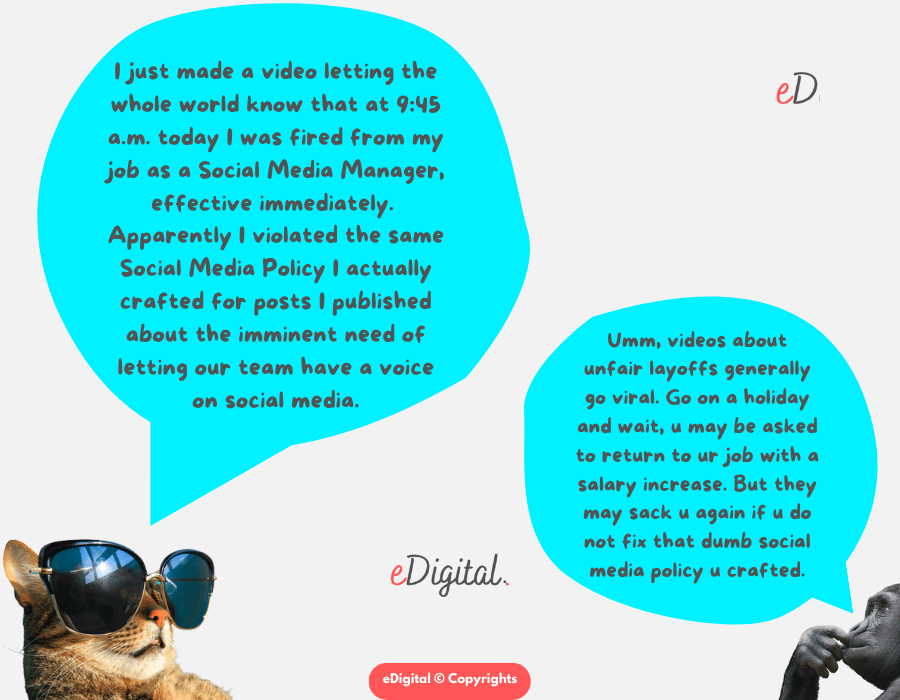
social media policy funny meme unfair layoffs violation viral video
The best tips when implementing a social media policy
- Have a clear record within your business that your employees are aware of the terms of the social media policy. Each employee should be asked to read and sign an acknowledgement that they have read the social media policy.
- Updates. Ensure you regularly update it to deal with new behaviour and new technologies.
- Accounts ownership. Add a clause about ownership of social media accounts that are utilised to market the business, and their forfeiture upon termination of the employment relationship;
- Be clear on what not to do. Your social media policy might state, for example, that employees should not:
- mention workplace disputes in a public forum;
- claim to speak on behalf of their employer without permission; or
- use the company logo, trademarks, IP and customers’ details without your company’s permission.
- Ensure that your employees are aware of the existence and current terms of your social media policy. Give employees regular reminders about the terms of your social media policy. If you conduct regular staff reviews or hold regular team meetings, these are great opportunities for discussing existing social media policy updates or changes.
- Names of those in the company who are allowed to speak on the company’s behalf via social media. If an employee is contacted via Facebook with a question or concern about the company, should they forward it to a certain company representative?
- Integration with other policies. It’s also important to ensure different policies are not viewed in isolation from each other, she says. For example, there should be clear interaction between the organisation’s social media policy, the internet and email use policy, and the bullying, harassment and discrimination policies. Each of these should refer to the social media policy, and the social media policy should refer back to them. If the policies are not integrated and, for example, social media is used to facilitate bullying, there could be confusion over which policy to apply to the situation.
- Consistent enforcement. Having a great policy is one thing, but failing to enforce it can undermine all your hard work. You need to properly identify and investigate potential policy breaches before speaking with the employee concerned, then carefully document the discussion or warning so that there is evidence of the breach. And be consistent in enforcing the policy across the board for all employees at all levels of seniority to keep the message strong. If staff members notice that some employees are getting away with posts that others are being disciplined for, the employer’s inconsistency could be used to challenge subsequent terminations. Regular or repeated breaches of your social media policy, particularly by a ‘repeat offender’ or an offending group, can create a hostile work environment and be damaging to your business. Although each breach viewed in isolation may not provide sufficient grounds for dismissal, multiple breaches viewed together may constitute serious misconduct. This is because repeat offences reflect a disregard for your business policies and priorities, and can destroy the trust in your working relationship. The Fair Work Commission considers repeated breaches of a social media policy by an employee to be incompatible with the employee’s duties and has upheld the decisions of employers to terminate employees in those instances.
- Clearly outline your expectations. Clearly and unambiguously outline the standard of behaviour expected of your employees by setting out what constitutes acceptable and unacceptable use of social media. Including examples where appropriate. This standard of behaviour can range from requiring your employees to maintain an updated Linkedin profile, to restricting your employees from making any reference to your business or its customers on social media.
- Reflect duties imposed by law. Your company and your employees have a variety of legal obligations under anti-discrimination and anti-bullying laws, and these aspects should be covered in your policy so that your employees are familiar with the legal requirements.
- Intellectual Property. Your business name, logo and slogan all constitute your intellectual property, which can be damaged and devalued if misused. Your social media policy should remind employees that your intellectual property is valuable and that their unauthorised use of it would likely result in real damage, including financial damage. Break down any misinterpretations about what is considered IP (Intellectual Property) and what it is not.
- Set out the consequences of non-compliance. To avoid the costly and time-consuming nature of legal action, it is vital that you clearly set out the consequences of failure to comply with your social media policy. Consequences can range from requiring an employee to attend a social media policy training session to an employee’s dismissal, depending on the seriousness of the breach.
- Group unacceptable social media use behaviours in your policy according to the likely consequences, so that your employees understand the severity of the behaviour and the corresponding consequences. Clarifying the consequences from the outset will assist you in effectively enforcing the policy if breaches occur. Your policy might also state that multiple minor breaches of the policy, taken together, can lead to dismissal. Employees should be made aware that some behaviour may have consequences that extend beyond the termination of employment. For example, misuse of your business’s intellectual property or specific instances of destroying customer relationships may give rise to a claim for damages with financial repercussions for the employee.
- Appropriately regulate personal use of social media. Just because your employee uses social media in their personal time does not mean that their use is private – in fact, it is usually for the whole world to see, including you and your customers. ( Example: People can easily take screenshots of Snapchat images and conversations). This means that it is common for companies to place appropriate restrictions on their employee’s personal use of social media in order to safeguard their organisation’s legitimate business interests. Recent decisions of the Australian Fair Work Commission show that disciplinary action may be taken against an employee if their social media use has seriously damaged their relationship with their employer, other employees or customers, or the reputation of their employer’s business. This remains the case even if the use was outside of normal working hours. Accordingly, your social media policy should set out your expectations regarding your employees’ use of social media for private purposes. For example, your policy may require your employees to name any online posts as their own opinion. This ensures that your business is distanced from any comment that your employee makes that does not reflect your business opinions. You should also consider whether it is appropriate to restrain your employees from discussing topics on social media that are likely to cause offence or incite an argument. Whether or not this is a reasonable policy will depend on the nature of your business and the degree to which your employee’s reputation is connected to the reputation of your business.
Popular this month: Social Media training for Government agencies
How to use this premium social media policy
- This social media policy template has been designed for easy editing on Microsoft Word so it is easy for you to modify it as you wish.
- Ensure your final Social Media Policy is saved as a PDF or any other secure file so no one can modify it without your approval.
How to win employee support of your new social media policy
- Having a Social Media Policy document is only the first step. You need then to find the most appropriate way to explain and remind your employees, franchisees and contractors about your company expectations when talking via social media channels.
- It is important – especially for new employees – to hand out a printed copy and explain what your social media guidelines are and what they mean. Giving them examples of both bad and great social media behaviour can reinforce your social media policy.
- For current employees, especially key brand ambassadors, public spoke persons, the CEO and other top executives; it is imperative to offer them training on best Social Media practices (posting, commenting, talking about competition and other employees).
Next: Get the best Social Media Policy template now!
Your social media guidelines should empower employee advocacy
If you want your employees to represent the brand enthusiastically but professionally on social media, guide them. A great social media policy instils confidence and helps to avoid messy mistakes. Here are some top tips to ensure you empower employee advocacy within your social media policy:
- Call out the type of messaging employees are encouraged to share. Let them know how valuable their voice is to the business and your customers. Encourage them to share their unique perspective and insight, to find the brand-boosting stories only they can tell. Encourage them to promote their co-workers as well, sharing congratulations on each other’s achievements and fostering community.
- Encourage employees to disclose that they work for your company, and to disclose the relationship when promoting any of your company’s clients. Finally, employees should never represent themselves as officially speaking for the company, and should make it clear their opinions are their own.
- Reinforce the company’s culture. Your company’s brand guidelines and culture should be a driving force in social media interactions. What company values do you want to project? Let employees know that they are responsible for upholding these values in all their social media communication. In general, it’s good to promote transparency, honesty and respect for individuals. That means being truthful about the brand and its competitors and never trashing other people or companies.
- Set expectations of privacy and appropriate behaviour. Remind employees that public posts on social media are reflective of the individual and the brand by proxy. For example, if an employee posts profanity-laden rants or political memes, that could have a negative effect on the business. Offer a brief explanation of how major social media platforms’ privacy features work, and how to restrict personal posts to friends only. Encourage mindfulness in choosing who to follow and accept as a follower, and encourage employees to separate personal and professional profiles.
- Addressing crisis management. make it clear who is responsible for speaking on behalf of the brand in such a crisis and what response is appropriate (i.e., when to stay silent, how to express condolences and what kinds of information to pass on).
- Addressing angry customers and/or trollers. Make it clear that arguments are never appropriate; that customer service issues should be passed to the right department and outright trolling should be ignored.
eDigital offers Corporate Social Media Training for employees. Contact us.
⭐️⭐️⭐️⭐️⭐️ Best template
The template made it easy for our team to provide guidelines and requirements for social media usage.
Freya P. ✅ Verified user
Reviewing your social media policy
With new social media platforms cropping up all the time, workplace social media rules must go beyond simply discouraging employees from putting off deadlines to play with Snapchat filters. In fact, your corporate social media policy could probably use some updating right now, and on at least an annual basis moving forward to reflect industry changes. That is if you even have one! Only 51 per cent of people said their employers have social media guidelines in a recent Pew Research Center survey.
No matter the size of your company, ask yourself this: When was the last time you reviewed your company’s social media policy? And if you don’t have a policy in place, what’s holding you back?
Here’s a closer look at why you’ll want to make an up-to-date social media policy a priority.
- Avoid legal scandals. In 2015, Chipotle’s gaffe lost a lawsuit for firing an employee who posted negative items on social media. The court found Chipotle’s social media policy actually violated labour laws. Work with your legal team to update your policy so it gets updated with legal changes coming out of your Trade Commission and any relevant Labor Relations Board. Your old policy needs to reflect the current legal standards. For instance, the USA FTC has clear guidelines regarding disclosures and endorsements. See how those affect your social media marketing.
- Protect company secrets. As the Society for Human Resource Management (SHRM) explains, a social media policy may actually help safeguard sensitive data from potential hackers and online scams, especially in a bring-your-own-device environment. Employees should also know that proprietary information about the company must never be shared – another aspect that needs to be regularly updated as the business grows. Protect your company’s information by identifying what is considered confidential, such as marketing tactics, non-public financials, future product launches and other “for internal use only” communications.
- Make it clear what type of social media activity is and isn’t allowed. While it might be obvious that posting illicit, offensive or insensitive material on a company-branded social media page is not a great idea, it still happens. For the people running social for your company, what checks and balances are in place to avoid a public relations disaster? Are the rules different for each platform? Make it easy to understand how employees will be held accountable for what they post on their personal pages and who will monitor that. Be as specific as possible in your social media guidelines.
You should also review your social media policy when:
- There has been a breach in the policy by an employee, you need to find out whether your policy was not clear enough.
- When there is a new way of social media communication on an existing social media platform or when there is a new popular social media platform.
Ideally, effective social media policies should be fluid and responsive to the fast-paced digital world. But at the very least, taking the time to perform a yearly review can check the validity of your guidelines, save your employees a lot of confusion — and help your company avoid potential pitfalls.
This professionally crafted template has been used by top marketers already using some of the best CRM marketing software such as Hubspot, SalesForce, Soho, ActiveCampaign and Social Media scheduling tools such as Hootsuite, Buffer, Later, SproutSocial, SocialPilot, Loomly or Planoly.
“It’s not the social media platforms that create issues for organisations, it’s the way employees and staff use social media. It’s about managing your team, not the tool”
Mau – eDigital‘s Digital Marketing & Social Media Specialist and training facilitator
Next: Get the best Social Media Policy template now!
The best social media policy – things to avoid
- Avoid policy requirements that are onerous and unreasonable. Example: suggesting employees control their friends’ commentary about your company via social media.
- Avoids threatening staff (Commonwealth Bank issue 2011) over the use and commentary via social media channels.
- Be inconsistent with your brand values. For example, if you do not want to be involved in political commentary, you may want your social media team to not publish anything related to politics as it can backfire.
In the below tweet, Rob Harris – a popular football (soccer) journalist – reminds football fans when Arsenal FC did not stand with Mestul Ozil (a Turkish player who was playing for Arsenal FC at the time) on the Uighurs Muslim community being killed in China. At the time, Arsenal published a statement confirming “not involving itself in politics”. However, in March 2022, they seem to be fully publicising their support to the Ukrainians; meaning the company is not consistent with its brand values.
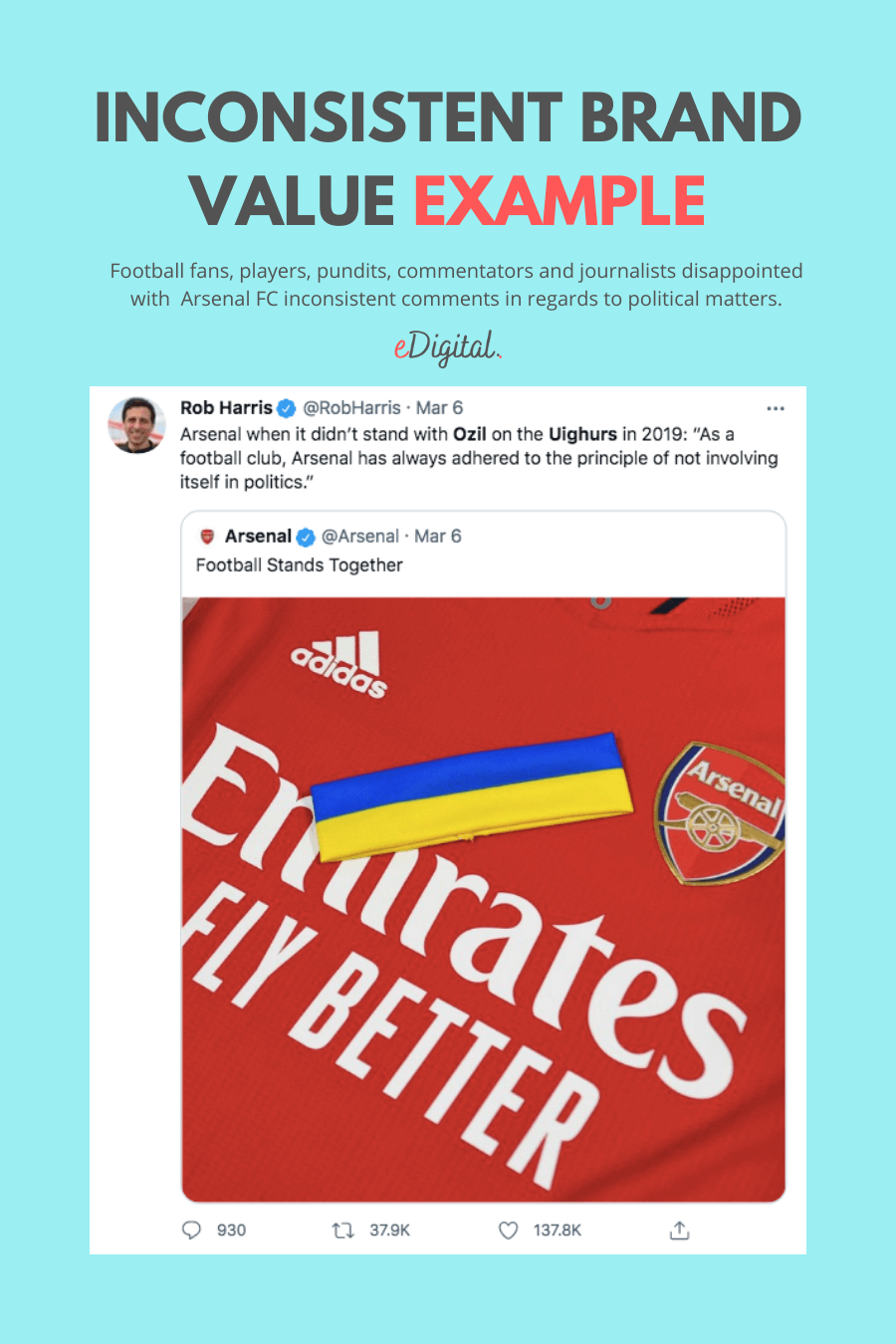
Inconsistent brand value example Arsenal FC politics
Marketers who read this article also read the top benefits of a social media policy.
Social media policy examples
Social media policy breaches
Two recent Fair Work Commission decisions illustrate how an employer has exercised its right to dismiss an employee who disregards its social media policy and the limitations that are imposed on an employer that purports to regulate its employees’ interactions on social media. Crucial in both decisions is the connection of the employee’s social media activities to the employment relationship and whether the employer’s social media policy is a legitimate means of protecting the reputation of the business.
Other examples of Social Media Policy breaches can be found on these links:
- WA Footballer Josh Bootsma was sacked from Carlton Football Club after sending naked photos to a fan via Snapchat
- How one tweet blew up ex-IAC PR executive Justin Sacco’s life.
- SBS journalist Marion Ives was sacked for commenting about SBS on her personal Facebook account.
- Accor’s Hotel chain PR Manager posted 100+ fake reviews on Tripadvisor under a pseudonym.
- Journalist Jemele Hill (Ex-ESPN anchor) was suspended for violating Social Media Policy (Oct 2017) because of tweeting that President Donald Trump was a white supremacist.
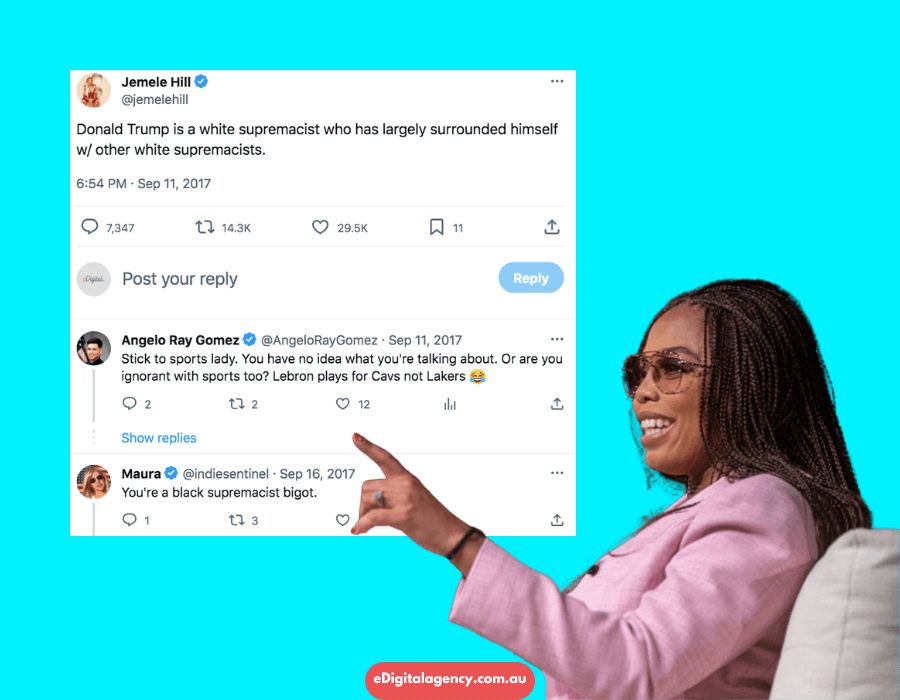
Jemele Hill tweeted that Donald Trump is a white supremacist
Next: Get the best Social Media Policy template now!
Controversial approaches to social media policies
- Ambulance Victoria Controversial Social Media Policy.
⭐️⭐️⭐️⭐️⭐️ Top template
The template helped us kickstart our first Social Media Policy draft in minutes. We did not have to figure out what we should be writing.
Milly Z. ✅ Verified user
Trending this week: how to write a social media policy – steps
Next: Get the best Social Media Policy template now!
Conclusion
Crafting a good social media policy can be tricky since it has to include legal considerations, brand guidelines, and your employees’ needs.
Keep in mind the goal is not to restrict their sharing to a handful of approved corporate messages. Rather, your guardrails should give them the creative space and encouragement to hit the road for your company.
When your employees advocate for your company responsibly, they bring humanity to your brand and help further their professional development at the same time.
Personal use of social media is not private. Appropriate regulation of your employees’ personal social media use is acceptable and enforceable.
Writing the best Social media policy is an excellent way for businesses to regulate a technology that can harm your employees and your business reputation.
Mastering your business’ social media policy implementation, content and enforcement will ensure that your business maintains a strong and positive online presence.
Final note: Are your marketing costs through the roof?
If your customer acquisition costs are climbing faster than a startup founder’s ego (after a successful IPO), and you’re hooked on paid ads like a reality TV star drama or a Tinder date who keeps accepting your dinner invites but never calls you back.
If that sounds like your situation, you should contact us.
Our exclusive digital marketing strategy workshops will mercilessly dissect your marketing, expose all the weak spots, and show you how to ditch the social media algorithms chokehold and build a marketing engine you actually own.
We’ll shake up your team’s thinking, drop fresh ideas and turn your marketing from “meh” to money-making.
Ready to stop burning cash and start making it? Hit us up! We offer:
🔥 Digital Marketing Strategy. Because hope is not a plan.
🔥 Online Ads (Google, Social, Remarketing). The art of spending money wisely for once.
🔥 Social Media Marketing Training. So you stop posting into the void.
🔥 SEO Strategy & Execution. Because if Google doesn’t know you exist, do you even?
🔥 Influencer & Celebrity Marketing. Get people with clout to talk about you.
🔥 Branding & Logo Design. So you don’t look like a dodgy side hustle.
🔥 Consumer Giveaways & Competitions. Because people will do anything for free stuff.
🔥 Email Marketing & Drip Sequences. Slide into inboxes the right way.
🔥 Conversion Rate Optimisation. Turn window shoppers into actual buyers.
Ready to start marketing like a boss? let’s talk. 🚀
HOW TO WRITE THE BEST SOCIAL MEDIA POLICY / GUIDELINES + TEMPLATE IN 2025
Considered one of the best marketing consultants in Sydney (and not just by Mau’s mom), Mau delivers killer digital marketing strategy workshops and best social media training so good, even your grandpa will get it.
5k+ smart marketers who love stealing good ideas receive Mau’s weekly email, while others tired of guessing use Mau’s Digital Marketing Plan and Social Media Plan templates.
Mau is travelling the 🌎 ✈️ probably posting questionable travel choices on TikTok or YouTube

